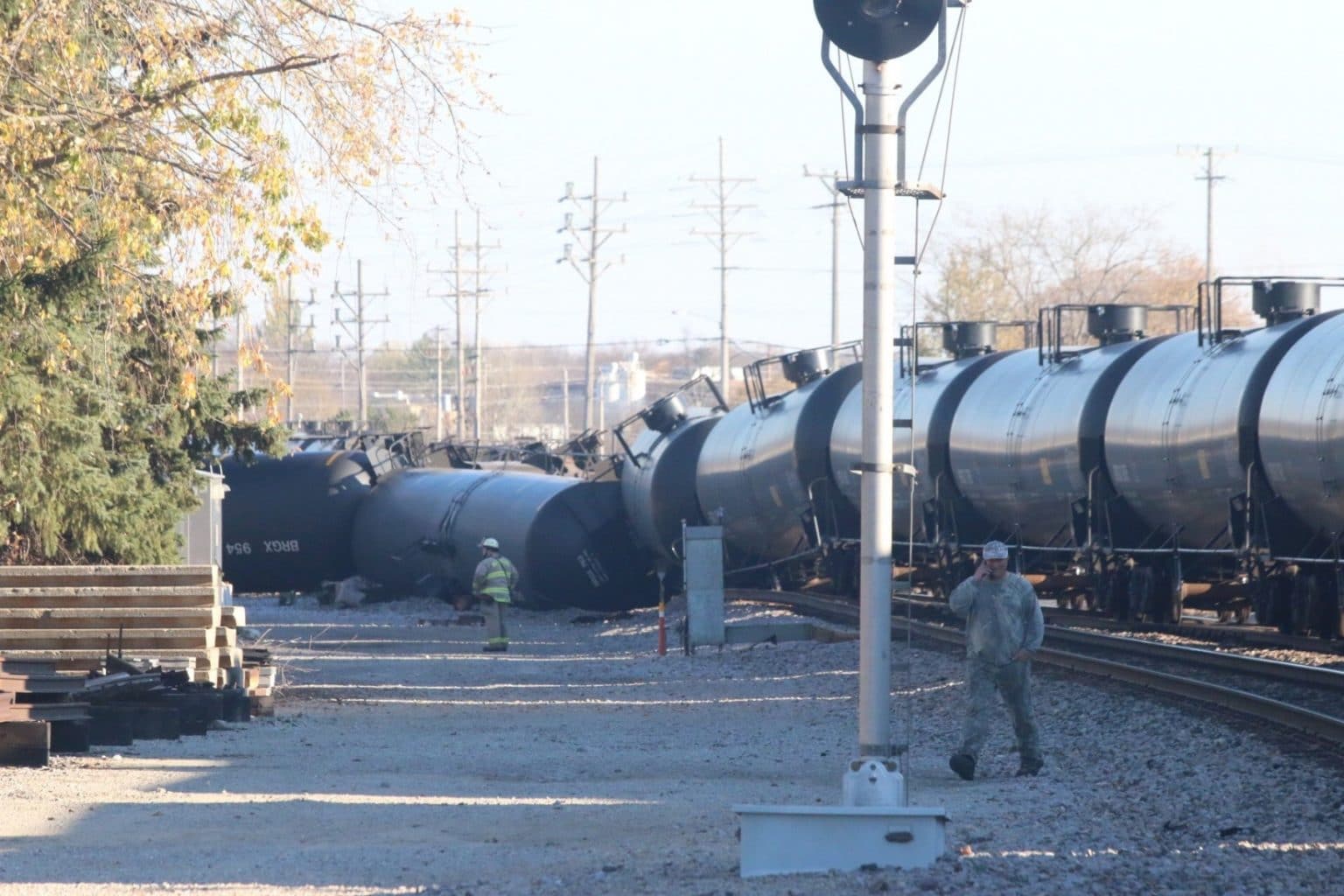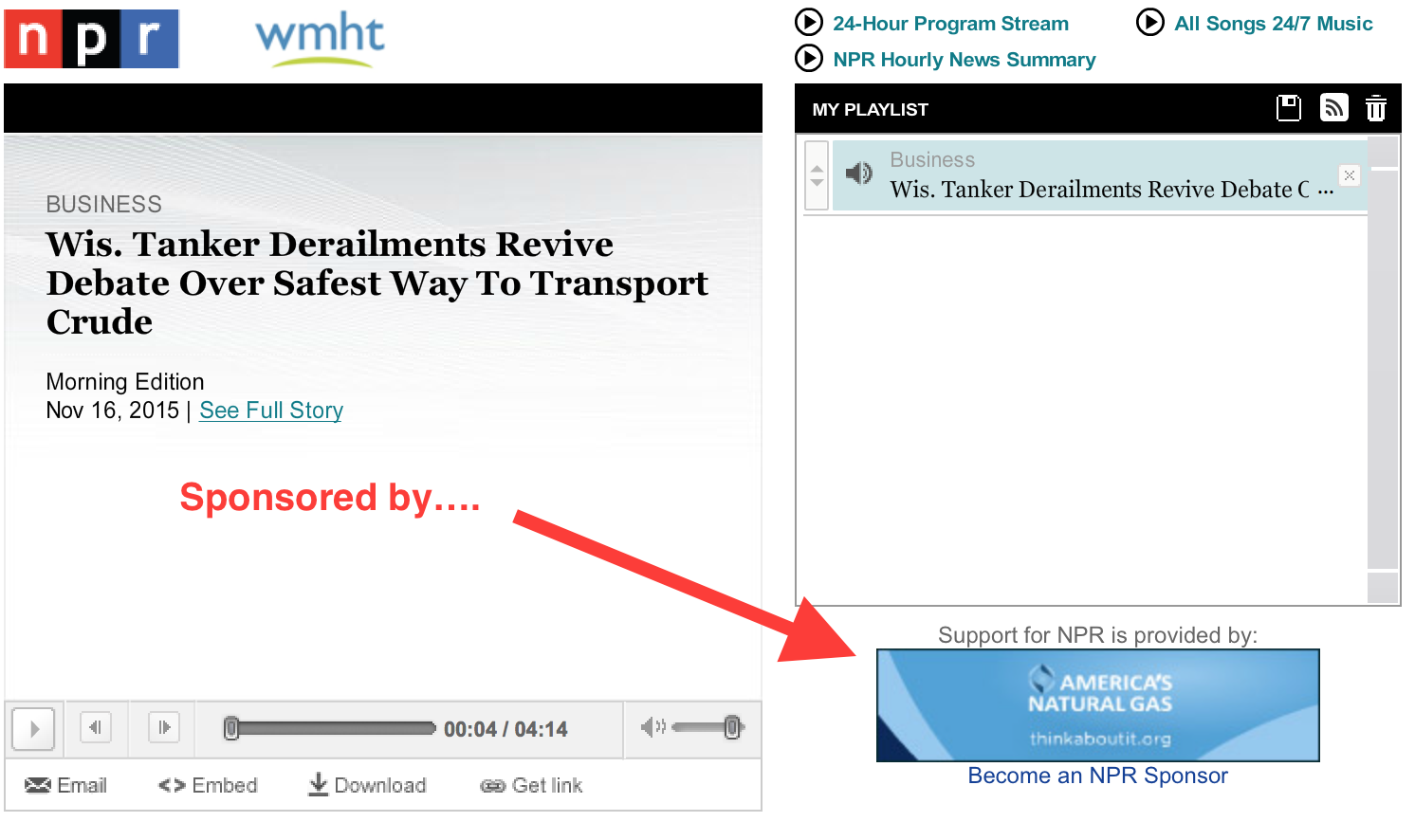On November 7th, a train carrying ethanol in DOT-111 tank cars derailed in Wisconsin, resulting in rail cars rupturing and a spill of 18,000 gallons of ethanol into the Mississippi River.
The next day, a train carrying Bakken crude oil derailed in a residential area in Watertown, Wisconsin, resulting in a spill of around 1,000 gallons of oil.
These two spills provide another stark reminder of the dangers of moving oil and ethanol along waterways and through residential areas.
It also apparently provided an opportunity for National Public Radio (NPR) to push multiple oil and rail industry talking points. And the article on NPR‘s website notes NPR is sponsored by America’s Natural Gas (ANGA).
The Flipside of Accuracy
The blurb that introduces the story about the two rail incidents has a curious introduction.
Wis. Tanker Derailments Revive Debate Over Safest Way To Transport Crude
Some worry the Obama administration’s decision to reject the Keystone XL pipeline will lead to a significant increase in the amount of crude being shipped by rail. It can also be shipped by truck.
Who are these “some” that “worry” exactly? Apparently, based on this report, just NPR employees and the oil industry lobbyist quoted in the piece. It also would appear the only one “reviving the debate” about the safest way to transport crude oil is NPR.
The radio piece is introduced with NPR host Steve Inskeep saying that they are following a story on “the flipside of rejecting the Keystone pipeline,” even though the story has nothing to do with that.
He then goes on to talk about how oil is moving from Canada by rail. And it is. However, the two trains that derailed were 1) not coming from Canada, 2) not carrying Canadian oil, and 3) not headed to the Gulf Coast. So, a completely misleading setup, but one that pushes the industry talking point that all pipelines should be approved because they are safer than rail transport.
This false argument ignores the reality that the most common destinations for Bakken crude shipments are U.S. East Coast refineries that can only be accessed by rail.
Building the Keystone XL pipeline — which would’ve run from Alberta across the US border south to connect with an existing pipeline system in Nebraska and then either to Illinois refineries or to Cushing, Oklahoma to continue south to the Gulf Coast refineries and export terminals — does nothing to change that fact.
The Tank Cars
The NPR piece then moves on to the notorious oil tank cars and notes how “safety advocates” are concerned about these tank cars. Reporter David Schaper notes that the new oil-by-rail regulations require that “Within a couple of years [the tank cars] be strengthened,” giving an unrealistic picture of how soon this issue will be addressed.
The regulations allow versions of the DOT-111 tank cars to remain on the rails carrying crude oil — like the oil involved in Lac-Megantic — until 2023. So unless a “couple” now means eight, this wasn’t even close to accurate.
The piece also quotes Karl Alexy of the Federal Railroad Administration explaining how — if the first accident in Wisconsin involved the new updated CPC-1232 cars instead of the DOT-111s — the spill may have been prevented.
This ignores the fact that there have been seven oil train accidents this year that have resulted in spills, and in five of those, also massive fires. They all involved the newer CPC-1232 cars.
Modern Brakes and Myth Making
The current braking technology on oil trains was invented in the late 1800s. The new regulations announced in May require modern electronically controlled pneumatic (ECP) braking systems on certain oil trains by 2021 and all by 2023.
When the new regulations were announced, regulators included the following language: “This important, service-proven technology has been operated successfully for years in certain services in the United States, Australia, and elsewhere.”
As noted on DeSmog, the rail and oil industries lobbied against a requirement for ECP brakes in the new regulations, and since then have stated intentions to not let this regulation stand.
The industry has argued the ECP braking technology is “unproven,” which David Schaper repeats in this piece despite the regulators having described it as a “proven technology.”
Earlier this year, DeSmog contacted the Federal Railroad Administration (FRA) to clarify the agency’s position on ECP brakes. And FRA was quite clear in its response.
“ECP brakes are a proven technology that will reduce the number of train derailments and keep more tank cars on the track if a train does derail. Delaying the adoption of ECP brakes seriously jeopardizes the citizens and communities along our nation’s freight network,” FRA communications director Matt Lehner told DeSmog.
A decade ago, the FRA commissioned consulting firm Booz Allen Hamilton to study the benefits and costs of ECP brakes for the U.S. freight-rail industry. Released in 2006, the firm’s report (PDF) stated that the brakes are a “tested technology” that offers “major benefits” and could “significantly enhance” rail safety.
And yet, NPR repeats the industry talking point that the technology is unproven.
NPR also describes the braking systems as “expensive,” which is technically true. An Association of American Railroads piece opposing ECP brakes estimates a cost of $1.7 billion. That’s a lot of money, until you consider the cost of say, rebuilding downtown Lac-Megantic, which was just one oil-by-rail accident that could have been prevented by ECP brakes.
Finally, NPR’s Schaper notes that because the industry says ECP brakes are unproven, this adds “uncertainty over the future of the oil train safety rules.”
The Concerned Mom
The one Wisconsin resident interviewed for the piece is Sarah Zarling. While not mentioned in the piece, Zarling became an oil train activist earlier this year over her concerns about the risks of the trains that ran so close to her home. Her concerns were obviously validated by this recent incident.
DeSmog contacted Zarling to comment on the NPR segment.
“I can’t even begin to talk about what they left out, honestly. I was so excited because he asked really good questions. He really does his homework,” Zarling explained. “So I really thought that this was going to be an opportunity to finally have a side of this story that is not told in the mainstream [media] finally be told and talked about. So the fact that I just came off as a mom cooking in her kitchen and heard this derailment is very disappointing.”
Reviving Debates, Delaying Safety
Sarah Zarling noted that she was impressed with David Schaper’s knowledge of the oil-by-rail issue and that he had “really done his homework.”
And yet the result is a segment pushing many of the top industry talking points, including setting the expectation that there is “uncertainty” that the new regulations will ever be implemented. Left out were any actual concerns or viewpoints from concerned citizen activists.
Some worry that the lack of regulation of the transportation of oil and ethanol by rail isn’t going to change because we “don’t have a high enough body count.”
As trains full of volatile Bakken oil continue to derail and the implementation of new safety regulations are many years away, the reality that at some point there will be “a high enough body count” becomes ever more likely.
Image credit: Train derailment in Watertown, Wisconsin by Sarah Zarling.
Subscribe to our newsletter
Stay up to date with DeSmog news and alerts








